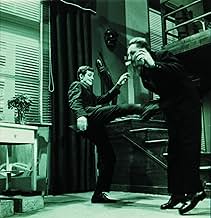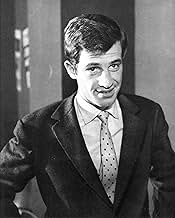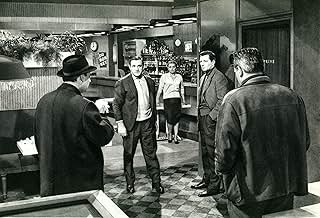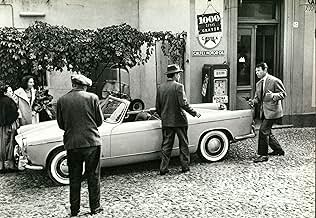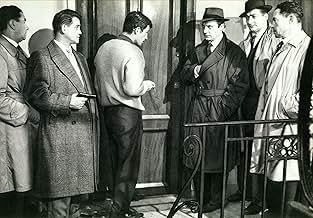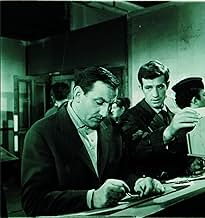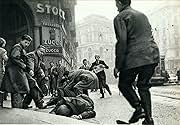Classe tous risques
- 1960
- Tous publics
- 1h 50min
NOTE IMDb
7,5/10
4,6 k
MA NOTE
Abel Davos est un criminel, traqué en Italie. La police se rapproche, alors lui et son copain Raymond s'arrangent pour s'enfuir en France avec la femme d'Abel, Thérèse, et leurs deux jeunes ... Tout lireAbel Davos est un criminel, traqué en Italie. La police se rapproche, alors lui et son copain Raymond s'arrangent pour s'enfuir en France avec la femme d'Abel, Thérèse, et leurs deux jeunes fils.Abel Davos est un criminel, traqué en Italie. La police se rapproche, alors lui et son copain Raymond s'arrangent pour s'enfuir en France avec la femme d'Abel, Thérèse, et leurs deux jeunes fils.
Simone Desmaison
- Thérèse Davos
- (as Simone France)
Jean-Pierre Zola
- Le patron de l'agence privée
- (as J.P. Zola)
Philippe March
- Jean Martin
- (as Aimé de March)
Histoire
Le saviez-vous
- AnecdotesCo-writer/Director Claude Sautet said after the shooting that he did not know that the Abel Davos - Danos - character was inspired by a gangster who collaborated with the Nazis against French resistance and Jews during German occupation.
- Citations
Eric Stark: The best thing about me is my left hook.
- ConnexionsFeatured in Claude Sautet ou La magie invisible (2003)
Commentaire à la une
"Classes tous risques" is one of the best "gangsters" films noirs France has ever produced.Perfect cast :Lino Ventura,a young Jean -Paul Belmondo (who made "a bout de souffle",Godard's thing, the same year),Marcel Dalio and a fine supporting cast ;brilliant script by José Giovanni -who also wrote "le trou" Becker's masterpièce the same year!What a year for him!;wonderful black and white cinematography by Ghislain Cloquet.And taut action,first-class directing by Claude Sautet,who surpasses Jean-Pierre Melville .Whereas the latter films gangsters movie with metaphysical pretensions,which sometimes lasts more than two hours,Claude Sautet directs men of flesh and blood,and the presence of the two children adds moments of extraordinary poignancy which Melville has never been able to generate .And Sautet avoids pathos,excessive sentimentality:the last time Ventura sees his children,coming down in the metro (subway)is a peak of restrained emotion.
Ventura portrays a gangster whose die is cast when the movie begins.He thinks that he can rely on his former acquaintances ,but they are all cowards -we are far from manly friendship dear to Jacques Becker ("touchez pas au grisbi" ) which Melville was to continue throughout the sixties-sometimes abetted by mean women (the film noir misogyny par excellence),living in a rotten microcosm,ready to inform on -we are far from Jean Seberg's simplistic behavior in Godard's "opus"-.
Cloquet works wonders with the picture:the scene on the beach in a starless night when the two children see their mother die after the shoot-out with the customs officers is absolutely mind-boggling.
There's a good use of voice-over,which Sautet only uses when necessary;thus ,the last lines make the ending even stronger than if we have attended the scenes.
Claude Sautet had found a good niche ,and he followed the "classes tous risques" rules quite well with his follow-up "l'arme à gauche" (1965) which featured Ventura again and made a good use of a desert island and a ship.Had he continued in that vein,France would have had a Howard Hawks.In his subsequent works ,only "Max et les ferrailleurs " (1971) showed something of the brilliance he displayed in the first half of the sixties.He had become ,from "les choses de la vie" onwards,the cinema de qualité director who used to focus on tender-hearted bourgeois in such works as "Cesar et Rosalie" (1972),"Vincent François ,Paul et les autres" (1974) or "Mado" (1976)
Ventura portrays a gangster whose die is cast when the movie begins.He thinks that he can rely on his former acquaintances ,but they are all cowards -we are far from manly friendship dear to Jacques Becker ("touchez pas au grisbi" ) which Melville was to continue throughout the sixties-sometimes abetted by mean women (the film noir misogyny par excellence),living in a rotten microcosm,ready to inform on -we are far from Jean Seberg's simplistic behavior in Godard's "opus"-.
Cloquet works wonders with the picture:the scene on the beach in a starless night when the two children see their mother die after the shoot-out with the customs officers is absolutely mind-boggling.
There's a good use of voice-over,which Sautet only uses when necessary;thus ,the last lines make the ending even stronger than if we have attended the scenes.
Claude Sautet had found a good niche ,and he followed the "classes tous risques" rules quite well with his follow-up "l'arme à gauche" (1965) which featured Ventura again and made a good use of a desert island and a ship.Had he continued in that vein,France would have had a Howard Hawks.In his subsequent works ,only "Max et les ferrailleurs " (1971) showed something of the brilliance he displayed in the first half of the sixties.He had become ,from "les choses de la vie" onwards,the cinema de qualité director who used to focus on tender-hearted bourgeois in such works as "Cesar et Rosalie" (1972),"Vincent François ,Paul et les autres" (1974) or "Mado" (1976)
- dbdumonteil
- 1 janv. 2004
- Permalien
Meilleurs choix
Connectez-vous pour évaluer et suivre la liste de favoris afin de recevoir des recommandations personnalisées
- How long is The Big Risk?Alimenté par Alexa
Détails
Box-office
- Montant brut aux États-Unis et au Canada
- 132 928 $US
- Week-end de sortie aux États-Unis et au Canada
- 11 945 $US
- 20 nov. 2005
- Montant brut mondial
- 132 928 $US
- Durée1 heure 50 minutes
- Couleur
- Rapport de forme
- 1.66 : 1
Contribuer à cette page
Suggérer une modification ou ajouter du contenu manquant

Lacune principale
What is the Mexican Spanish language plot outline for Classe tous risques (1960)?
Répondre



